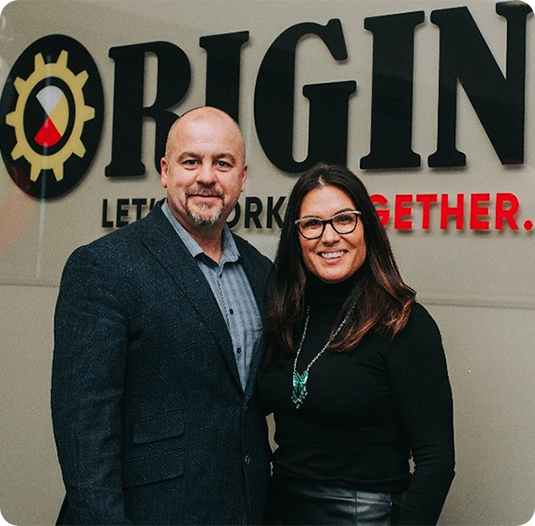Announcements
For press opportunities, please email info@immersivelink.ca.

Indigenous Youth Finding Connection to Career & Culture
From a young age, we are asked “what do you want to be when you grow up?”. Your answer may have been influenced by what you saw adults around you working in or a career that is talked about most often in school or in the community. Youth can often feel a pressure to pursue a specific path regardless of their interests. We see mainstream education and training institutions reinforce traditional education and career paths that don’t align with everyone. Specifically, Indigenous youth may find themselves with a lack of guidance in career support and be lost as to what direction to take or lack confidence in career readiness and where they can find success. Today, I want to dive into the topic of how we support Indigenous youth moving forward and how traditional education and training systems limits their abilities to reach their potential.
Culture is something that shapes who you are. It frames your beliefs, values, and ways of life. Due to the history of Indigenous peoples in Canada, we have seen how our culture has been erased and discriminated against. For so long, it wasn’t something we could celebrate. As Canada moves along it’s reconciliation journey, we have seen advancements in the support for Indigenous peoples and education for the non-Indigenous population. Unfortunately, this doesn’t erase the history, continued lack of resources and funding, and discrimination that our communities still face today. Our youth will be the ones carrying our traditions forward and continuing to share Indigenous knowledge with generations to come. We want to help inspire youth to learn more about who they are and see how their culture has shaped them into the person they are today.
“Culture is something that shapes who you are. It frames your beliefs, values, and ways of life.”
Connecting to Culture through Indigenous Knowledge
I feel that Culture is a cornerstone of any Indigenous engagement in order to advance true reconciliation, and we embed this into all our engagement activities. Our youth programs, including our youth workshops, always contain a cultural element. Whether this be a hands-on activity, hearing a teaching from a knowledge keeper or trying out an experiential learning experience with our ImmersiveLink Cultural library. Those of who have participated in our workshops have said that this cultural knowledge component has been instrumental and has been backed up by the feedback that we have received in participant surveys.
From my own experience, and the youth who attend schools on-reserve or off, we all encountered obstacles. Schools on-reserve tend to lack funding which translates to a lack of staff to provide education and training to these students and even less opportunity to have support staff in place to provide guidance for their personal and professional growth. Youth attending schools off-reserve often find themselves experiencing racism, discrimination, and a lack of community as the mainstream school system was never designed to incorporate Indigenous knowledge and culture. These factors take a toll on confidence and self esteem which impacts their readiness to take on changes and challenges at an important stage of their life. When it comes to providing resources, not only do they need to be the right resources, they need to be accessible. Youth are faced with many barriers that include not having access to mentors, course materials and travel costs associated to attending workshops. When developing new programs for youth, considering their needs and sensitivities are essential to achieve meaningful outcomes and will sustain them.
Since the experiences youth have had in educational and training settings may not always be the most positive, creating a safe space where they feel comfortable and encouraged will allow them to get the most out of any workshop or session.
Career Readiness and Personality Dimensions
Outside of helping youth in making that deeper connection to their culture and creating a space for them to learn and explore, giving them the chance to better understand themselves plays a huge role in their ability to further grow personally and increase their career readiness. They will also be able to take what they learn about their personalities and draw connections between Indigenous culture and how that has impacted who they are today.
“Outside of helping youth in making that deeper connection to their culture and creating a space for them to learn and explore, giving them the chance to better understand themselves plays a huge role in their ability to further grow personally and increase their career readiness.”
Therefore, we have incorporated the Personality Dimensions assessment which enables them to gain a better understanding of their strong suits and interests and the types of settings they enjoy. They can determine if they are a creative or analytical thinker or if they prefer hands on work versus an office setting. Knowing these key traits about themselves will allow them to narrow down the types of careers that would suit their specific traits. From here, youth can explore online, try out experiential learning tools like our simulator training and IL Careers experiences, or chat with us about potential careers opportunities and develop a plan of action on what the next steps are to get there.
Seeing youth leave a workshop inspired and confident leaves me feeling a sense of pride for not only these youth but for our communities. Being able to see these youth take action and connect to career shows just how strong and resilient Indigenous peoples are and how we are only going to continue to succeed. I am proud of our team and specifically our Indigenous Engagement Specialists, who can work with you and your community to develop a youth program to support them in not only in their career
To contact our Indigenous Engagement Team today, fill out the contact form here.
Let’s work. Together.
